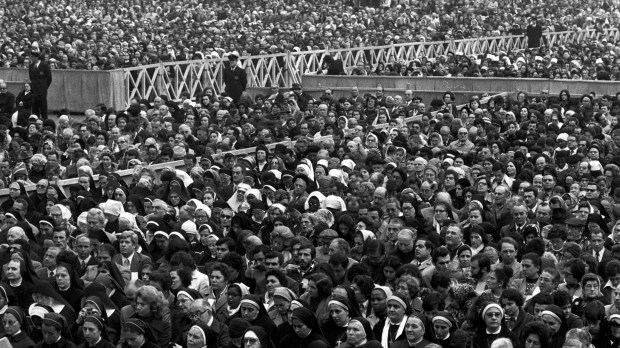Friday 21 October 2022
~
1. Why Vatican II was necessary
2. “I didn’t expect such a big gift,” says Pope Francis’ cousin, who he will visit for her 90th birthday
3. Dioceses in Germany still haven’t recovered from the pandemic
4. The Holy See is “not opposed” to nuclear power for civil use
5. Dialogue and reconciliation are not an option, says Patriarch Bartholomew
~
1Why Vatican II was necessary
American Catholic author George Weigel assesses why the Second Vatican Council was necessary, a question often raised today by young Catholics who “imagine that everything in Catholicism was copacetic until John XXIII made the fatal mistake of summoning an ecumenical council.” “In this suffocating atmosphere of unctuous and arrogant imbecility, perhaps a scream—chaotic but Christian—would do some good,” said Msgr. Giuseppe De Luca, a cleric of the Holy Office, in 1953. The Swiss theologian Hans Urs von Balthasar was concerned that the Catholic tradition had “slipped out of the [Church’s] living center of holiness.” In the years following the Council, Joseph Ratzinger identified other reasons why Vatican II was necessary. According to him, “[the] Council reinserted into the Church as a whole a doctrine of [papal] primacy that was dangerously isolated; it integrated into the one mysterium of the Body of Christ a too-isolated conception of the hierarchy; it restored to the ordered unity of faith an isolated Mariology; it gave the biblical word its full due; it made the liturgy once more accessible; and, in addition, it made a courageous step forward toward the unity of all Christians.” Likewise, the Council’s rejection of Catholic triumphalism was good in itself and necessary for its mission: “it was both necessary and good for the Council to put an end to the false forms of the Church’s glorification of self on earth, and by suppressing her compulsive tendency to defend her past history, to eliminate her false justification of self,” explained the future Pope Benedict XVI. It is time,” he wrote, “to reawaken our joy in the reality of an unbroken community of faith in Jesus Christ. We must rediscover that luminous trail that is the history of the saints and of the beautiful—a history in which the joy of the Gospel has been irrefutably expressed throughout the centuries.” The Church’s proclamation and apologetics before the Council were logically very strong, George Weigel explains. However, a world that had become irreligious was not, in general, going to be converted by logical demonstrations and had to be converted by holiness and by a Church that offered more beauty than the world could create, the American author concludes.
First Things, English
2“I didn’t expect such a big gift,” says Pope Francis’ cousin, who he will visit for her 90th birthday
Carla Rabezzana, who lives in the small village of Portacomaro in the province of Asti, did not expect to celebrate her 90th birthday on November 19 with her first cousin, Pope Francis. “I didn’t expect such a big gift,” she told the Piedmontese edition of Italian daily Corriere della Sera. Still living on the land that Jorge Mario Bergoglio’s father left to make his fortune in Argentina, the almost nonagenarian has had a special relationship with the Pope for a long time, phoning him about once a month. The news of his arrival moved her: “I told him that it made my heart beat faster and he replied: ‘Try not to die! And we burst out laughing.” In the past Rabezzana often hosted her cousin in Turin, when he came to Europe to continue his studies. Today, her land – half a hectare, a “papal vineyard” – still produces “grignolino,” which she explained is “among Giorgio’s favorite wines, along with bagna cauda, a dish he loves.” She is also happy that the Pontiff, whom she calls “Giorgio,” has remained “a humble person.”
Corriere della Sera, Italian
3. Dioceses in Germany still haven’t recovered from the pandemic
Attendance at Church services in Germany has changed dramatically since the end of the pandemic. However, the decline is not the same everywhere.
Katholisch, German
4. The Holy See is “not opposed” to nuclear power for civil use
Michael Czerny, head of the Dicastery for Promoting Integral Human Development, and supporter of the strong ecological orientation outlined in the encyclical Laudato si’, assures in an interview that the Holy See has always considered the civil use of nuclear power without prejudice or ideological schemes.
Il Gazzettino, Italian
5. Dialogue and reconciliation are not an option, says Patriarch Bartholomew
In an interview, Ecumenical Patriarch Bartholomew I speaks about the war in Ukraine, the Russian Orthodox Church and the quest for Christian unity.
The Pillar, English

